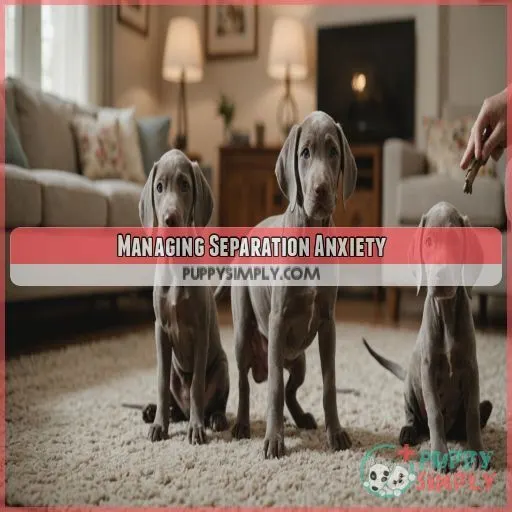This site is supported by our readers. We may earn a commission, at no cost to you, if you purchase through links.
 Wrangling a Weimaraner? Don’t fret – you’ve got this! Start with positive reinforcement, rewarding good behavior with treats and praise.
Wrangling a Weimaraner? Don’t fret – you’ve got this! Start with positive reinforcement, rewarding good behavior with treats and praise.
Establish consistent commands, and avoid punishment.
Socialize your pup early, exposing them to new people and places.
Manage separation anxiety by providing exercise and engaging toys.
Address common issues like chewing and leash pulling with redirection and patience.
And don’t forget the early training – short, simple sessions build a strong bond.
With a dash of consistency and a sprinkle of creativity, you’ll be dancing through Weimaraner training in no time.
Ready to take your pup to the next level?
Table Of Contents
- Key Takeaways
- Weimaraner Training Basics
- Socialization Strategies
- Managing Separation Anxiety
- Common Behavioral Issues
- Early Training and Development
- Tips for Successful Weimaraner Training
- Overcoming Common Challenges
- Frequently Asked Questions (FAQs)
- Are Weimaraner puppies hard to train?
- How to discipline a Weimaraner puppy?
- When should I start training my Weimaraner puppy?
- How to calm a Weimaraner puppy?
- How can cluster training enhance obedience in Weimaraners?
- What age is best for starting cluster training?
- Are there specific cluster training techniques for puppies?
- How does cluster training improve focus and attention?
- Can cluster training help with socialization among other dogs?
- Conclusion
Key Takeaways
- Start Early and Keep It Short: Dive into cluster training when your pup is just a wee one, around 7-8 weeks old. Keep those sessions short and sweet, like quick sprints, to match their zippy attention spans. It’s like planting seeds in a fertile mind for a lifetime of learning.
- Break It Down: Cluster training is about short bursts of activity. Think of it like interval training for dogs – focused but fun! This keeps your Weimaraner engaged and keeps them coming back for more. It’s all about keeping their brain buzzing.
- Mix Fun with Learning: Add a pinch of play to your training. Use games and rewards, like a treasure map filled with treats! This way, your pup sees training as a fun adventure, not a chore. It’s like turning study time into a treasure hunt.
- Social Skills on the Go: Enhance socialization by introducing your pup to cluster training scenarios where they meet other dogs. It’s like taking them to a well-structured doggy meet-and-greet. Your furry companion will soon be the life of the puppy party!
Weimaraner Training Basics
Weimaraner training is all about understanding the unique needs of this breed and responding with the right techniques. You’ll learn how to use positive reinforcement effectively, master the art of treating and praising, and establish a consistent command style.
Positive Reinforcement Techniques
Positive reinforcement is a powerful tool in your Weimaraner puppy training arsenal.
It’s all about rewarding good behavior to encourage more of it.
Think of it like a game where your pup gets treats, praise, or a favorite toy for doing something right.
This simple technique is a cornerstone of effective dog training and can help you shape your Weimaraner’s behavior in a positive, rewarding way.
Effective Use of Treats and Praise
Now that you understand the importance of positive reinforcement, let’s get into the specifics of using treats and praise effectively. Timing is everything when it comes to treat timing. You want to reward your pup within seconds of them doing something awesome. If you wait too long, they won’t understand what they’re being rewarded for. So, keep those treats within easy reach!
Variety is the spice of life, and it’s the same with praise. Mix it up to keep your Weimaraner engaged and motivated. Use a range of verbal praise, petting, and treats to reinforce good behavior. Your pup will stay keen to please and might even show off a little!
Avoiding Punishment and Negative Reinforcement
Training your Weimaraner pup is all about positive reinforcement. Avoid punishment and negative reinforcement techniques, which can lead to mistrust and even encourage misbehavior. It’s really important to understand that your dog is always learning from you, so focus on building a strong, trusting relationship.
Instead of punishment, redirect unwanted behaviors with alternative strategies and reward good behavior. It’s all about effective communication and building trust.
Establishing Consistency in Commands and Signals
Consistency is key when training your Weimaraner puppy.
Use the same verbal cues and hand signals for each command, like "sit" and "stay."
Mix in treats and praise to reinforce good behavior.
But remember, your pup shouldn’t just obey for the treat; they should listen to you, too.
Keep training sessions short and sweet, and always end on a positive note.
Socialization Strategies
Socialization is a key part of Weimaraner puppy training, and it starts early—like, really early. We’re talking about exposing your pup to new people and places when they’re just 7 weeks old. But don’t worry, we’ll guide you through it step by step.
Early Socialization From 7 Weeks Old
early socialization is key to raising a well-adjusted Weimaraner puppy. From 7 weeks old, your pup is ready to explore the world and meet new people, but there are a few things to keep in mind:
- Positive Exposure: It’s important to introduce your puppy to a variety of people and places, but always make sure it’s a positive experience. You don’t want to overwhelm them, so take things at their pace and keep it fun.
- Social Butterfly: Aim for daily interactions with strangers, which will help your pup develop a friendly and confident disposition. A quick chat with a neighbor or a walk in the park can provide valuable socialization.
- Puppy Playdates: Organize playdates with other puppies or dogs you know are fully immunized. This will help your Weimaraner learn important social skills and create positive associations with other dogs.
- Fear-Free Approach: Be cautious about exposing your puppy to unknown dogs before they’re fully vaccinated. You don’t want their first experience to be scary or potentially dangerous. Stick to puppy playgroups or ask your breeder for referrals to reputable breeders with socialized dogs.
Exposing Puppies to New People and Places
Now that your Weimaraner puppy is 7 weeks old, it’s time to start exposing them to new people and places so they grow into a well-adjusted adult dog. This early socialization will help your pup develop a positive disposition and prevent them from becoming aggressive toward people or other dogs later in life.
Here are some practical strategies to get you started:
- Introduce your puppy to a variety of people, including men, women, children, the elderly, people of different ethnicities and races, and people with different physical characteristics like beards, sunglasses, or those using canes or wheelchairs.
- Take your puppy to different places, such as parks, sidewalks, pet-friendly shops, and friends’ homes.
- Expose your puppy to different sounds and sights, like city streets with passing cars, bicycles, and people doing various activities like gardening or yoga.
- Enroll your puppy in a puppy kindergarten class to help them learn and interact with other dogs in a controlled environment.
- Continue to provide treats and praise during these socialization experiences to create positive associations.
- Go at your puppy’s pace and avoid overwhelming them. Gradually increase their exposure to new stimuli to ensure they remain calm and curious.
Caution With Unknown Dogs Before Immunization
Puppy health is a top priority! Before your Weimaraner is fully vaccinated, it’s wise to avoid unknown dogs. Think of their immune system like a superhero suit still in the making. To keep it strong, remember:
- Stick to a vaccination schedule
- Stay aware of socialization risks
- Preventable diseases lurk in unexpected places
Keep them safe while they explore!
Daily Interaction With Strangers for Positive Disposition
After ensuring your puppy’s health, it’s time to roll out the welcome mat! Regular interactions with strangers build a positive disposition and are the secret sauce to successful puppy socialization. These early exposures are like giving your Weimaraner a VIP pass to the world, helping them greet new faces without turning into a fuzzy ball of anxiety.
Managing Separation Anxiety
Managing separation anxiety in your Weimaraner can feel like preparing for a toddler’s first day at kindergarten; it takes patience, love, and maybe a few treats. Keep your pup calm and happy by providing exercise, using crate training, and teaching them to embrace alone time without eating your favorite shoes.
Recognizing Signs of Separation Anxiety in Weimaraners
Socialization is a breeze with a Weimaraner pup, but watch out for separation anxiety. If your dog transforms into a pacing, whining, or hiding machine, they might be experiencing anxiety. Keep tabs on sudden destructive behavior or excessive barking—it’s their way of saying, “Hey, I miss you!” Spotting these signs early makes it easier to help them.
Providing Exercise and Stimulation to Reduce Anxiety
Spotting separation anxiety is step one; keeping your Weimaraner entertained is key to reducing it. Engage their mind—consider interactive toys or puzzle feeders. Outdoor play and agility training? Absolutely! Think of a tired dog as a peaceful one. It’s like giving them a mental spa day. Your goal is a happy pup who’s too busy for anxiety.
Crate Training for Separation Anxiety and Destructive Behavior
You’ve given your Weimaraner a workout, now let’s talk crates.
Crate training benefits include managing separation anxiety and curbing destructive behavior.
Choose the right crate size: think cozy den, not a bachelor pad.
Introduce it gently; age matters, so start early to avoid crate anxiety.
Training Weimaraners to Be Comfortable Alone
Weimaraners are people-pleasers, so leaving them alone can cause anxiety.
Crate training is a game-changer – it gives them a cozy den to call their own.
Start slow, leaving them for short periods, and gradually increase the time apart.
Provide puzzle toys and chews to keep them occupied.
With patience and consistency, your Weimaraner will learn to feel safe and content when you’re not around.
Common Behavioral Issues
Understanding your Weimaraner’s unique quirks, like their love for chewing shoes or enthusiasm for jumping on guests, can be an entertaining but essential part of training. We’ll guide you with practical tips to turn these antics into well-mannered behaviors, ensuring your energetic companion is both adored and well-behaved.
Chewing and Swallowing Non-Food Items
Leaving your Weimaraner alone can lead to surprising adventures, like chewing everything in sight! It’s a dog’s way of exploring, but we can’t have Fluffy mistaking your shoes for chew toys. Prevent mishaps by providing safe chew toys and consistent training. Address boredom and anxiety with exercise and engaging activities. Remember, a tired dog is a happy dog!
Pulling on Leashes and Jumping Up
Pulling on the leash and jumping up are common Weimaraner behaviors that need addressing. Use positive reinforcement to teach your pup loose leash walking and polite greeting manners. Reward calm, focused behavior with treats and praise. Gently correct jumping by turning away or stepping back. With patience and consistency, you can curb these pesky habits.
Barking and Whining – Causes and Solutions
If your Weimaraner’s bark rivals the neighbor’s car alarm, you’re not alone. Barking and whining often spring from boredom, anxiety, or the mailman’s suspicious walk. To calm your furry friend, identify barking triggers and whining patterns. Use calming techniques and toys to engage them. They’re great at owner communication, albeit loudly! Remember, patience and consistency go a long way.
Redirecting Unwanted Behaviors With Positive Reinforcement
Barking got you down? Let’s shift gears to tackle those pesky behaviors. When your Weimaraner starts puppy biting or leash pulling, redirect with a fun toy or treat. It’s like offering a friend pizza instead of broccoli. Reward good moments with praise. Potty training mishaps? Catch them doing right, and make it a Broadway-worthy celebration!
Early Training and Development
Starting puppy training as early as 5 weeks old can set your Weimaraner up for success. Keep those sessions short and simple, and be sure to give your pup a good run or walk beforehand to help them focus.
Starting Basic Training Sessions at 5 Weeks Old
- Consistent Commands – like a favorite pair of socks.
- Focus on Positivity – it’s catching!
- Puppy Love – who can resist those eyes?
Train like a pro!
Keeping Training Sessions Short and Simple
Imagine this: Your Weimaraner puppy as a learner! Keep training sessions short and simple, just like a quick coffee break. Puppies have the attention span of a squirrel, so reward focus and make it fun. Here’s a quick guide:
| Topic | Action |
|---|---|
| Duration | 5-10 minutes |
| Focus | One command |
| Reward | Treat & praise |
| Energy Level | Keep it light |
Avoid overload, and you’ll have a well-behaved puppy in no time!
Pre-Training Walks and Runs for Focus and Energy Release
You’ve nailed short sessions, now let’s chat about pre-training routines. A little energy management goes a long way! A brisk walk or run before training can work wonders:
- Exercise Types: Mix walks with playful runs.
- Walk Duration: 10–15 minutes usually does the trick.
- Focus Benefits: A tired pup’s a focused pup.
You’ll bond soon enough!
Building Strong Bonds Through Early Training
When you start training your Weimaraner pup early, you’re not just teaching commands – you’re building a strong bond that’ll last a lifetime. Puppy playdates and positive reinforcement help your pup feel safe, secure, and ready to learn. Plus, those early communication cues you teach will make your life together a whole lot smoother.
Tips for Successful Weimaraner Training
Training a Weimaraner puppy successfully requires consistency, patience, and maybe a little caffeine for you. By staying calm and assertive while recognizing their sky-high energy levels, you’ll soon have a well-behaved dog that doesn’t see treats as bribes but as well-deserved rewards.
Consistency and Patience in Training
Consistency and patience in training are your secret weapons. When your Weimaraner feels like herding butterflies, remember:
- Stick to your routine.
- Repeat commands with the same tone and words.
- Celebrate small victories—your pup’s a mere mortal, not a mind reader.
- Laugh off mistakes; after all, Rome wasn’t built in a day, and neither is a perfectly trained pup.
Rewarding Good Behavior and Ignoring Bad Behavior
Rewarding your Weimaraner’s good behavior boosts confidence and creates joy! Use treats and praise—it’s a positive reinforcement powerhouse. Ignore bad behavior without drama; even a glance can be rewarding. Consistency is key here, just like in cooking or ballet. If they’re ignoring distractions, reward focus like they’ve struck gold! Let’s master this together!
| Command | Treat | Praise |
|---|---|---|
| Sit | Small Piece | "Good Dog" |
| Stay | Kibble | "Well Done" |
| Focus | Soft Chew | "You’re Great!" |
Staying Calm and Assertive in Training Sessions
Staying calm and assertive during training sessions is really important for Weimaraners. Avoid raising your voice or getting frustrated – this can confuse and overwhelm your pup. Instead, use a firm yet gentle tone, maintain steady eye contact, and project confidence. Your dog will respond better to a patient, authoritative approach. Remember, training is a partnership, not a battle of wills.
- Speak in a calm, clear voice
- Use positive body language (upright posture, relaxed shoulders)
- Maintain consistent rules and expectations
- Reward good behavior with praise and treats
Being Aware of Weimaraner Energy Levels and Needs
Every Weimaraner, with their boundless energy, is like a furry rocket ship ready for takeoff! To keep them grounded, make sure their exercise and mental stimulation are on point. Don’t skimp on diet or sleep either. Mix in socialization and watch them shine. Remember, if you’ve got a tired pup, you’ve got a happy Weimaranerand more peace for yourself!
Overcoming Common Challenges
Training a Weimaraner isn’t always a walk in the park, but don’t worry, you’ve got this! Whether you’re managing their high energy or ensuring they don’t escape like little Houdinis, these tips will help you handle common challenges with ease.
Handling Weimaraners at Dog Shows and Public Events
Showing off your well-trained Weimaraner in dog shows or public events? A colorful spectacle! Nail showmanship by mastering leash manners and crowd control. Practice with distractions at home. For grooming tips, make sure that shiny coat‘s a head-turner. Travel logistics? Plan smartlydogs detest surprises. Remember, a calm owner "leads the pack." Whether strutting or mingling, you and your Weimaraner belong.
Addressing Mispronunciation of the Weimaraner Breed
Addressing the tricky Weimaraner name is a must. Don’t worry – you’ve got this! Start by learning the proper pronunciation: "Vy-mah-ruh-ner." Mastering the breed’s German origins can help you avoid common misspellings like "Weimeraner." With a little practice, you’ll be rolling those Rs like a pro in no time. Your Weimaraner will appreciate your effort to get their name right!
Managing High Energy Levels in Weimaraners
After nailing Weimaraner pronunciation, tackle their zippy energy. Imagine them as furry Energizer bunnies! Establish a solid exercise routine with brisk walks. Mix in mental stimulation like puzzle toys or training games. Remember, a healthy diet impacts energy. Try playtime ideas like fetch. Keep it light-hearted; they’re not just dogs—they’re your spirited sidekicks on four paws!
Preventing Destructive Behavior and Escapes
Escape-proofing your home is like building a fortress for your curious Weimaraner. Stay ahead by:
- Installing secure fences, keeping Houdini moments at bay.
- Providing chew toys for chewing prevention; keep the shoes safe!
- Supervising them in the yard; run interference on mischief.
- Scheduling play sessions to burn energy, so they don’t dismantle your couch!
Keep your pup safe and sound.
Frequently Asked Questions (FAQs)
Are Weimaraner puppies hard to train?
Training Weimaraner puppies might seem like juggling flaming bowling pins, but don’t fret. They’re intelligent and keen to please. Consistent routines, patience, and a stash of treats build the bond and guarantee a well-behaved, joyful companion.
How to discipline a Weimaraner puppy?
Discipline your Weimaraner puppy with gentle redirection rather than punishment. Catch them mid-mischief, guide them to desired behavior, and reward them. They’re quick learners, so consistency and patience work wonders like teaching a toddler to dance!
When should I start training my Weimaraner puppy?
Ah, the enthusiastic Weimaraner pup – a bundle of energy just waiting to learn! Start training as early as 5 weeks old, but keep sessions short and sweet. Consistency is key, so get ready to reward that good behavior with treats and praise. You’ve got this, pup parent!
How to calm a Weimaraner puppy?
Calm your Weimaraner puppy with a walk to burn energy, then give a cozy, quiet space to relax. Toss them a chew toy or a puzzle treat to keep their mind busy. It’s like doggy yoga!
How can cluster training enhance obedience in Weimaraners?
Oh, so you thought training a Weimaraner was just like any other dog? Cluster training, my friend, builds obedience by using short, focused bursts. This method’s perfect for keeping their attention, ensuring results you can brag about.
What age is best for starting cluster training?
Start cluster training your puppy at 7-8 weeks old; it’s like planting seeds in fertile soil, setting the stage for lifelong learning. Keep sessions short and sweet to match your puppy’s attention span and energy levels.
Are there specific cluster training techniques for puppies?
Cluster training for puppies? It’s like giving your pup a super power! Break sessions into bite-sized chunks, add fun with games, and sprinkle rewards like confetti. Keep it light, keep it frequent, and watch your pup soar!
How does cluster training improve focus and attention?
Cluster training works wonders for your dog’s focus by gradually introducing distractions. It’s like teaching them to dance in chaos, so they tune out the world’s noise and lock eyes with you, ready for action.
Can cluster training help with socialization among other dogs?
Think of cluster training like a friendly, doggy tea party—it’s structured yet relaxed. It helps your pup mingle gracefully with new pals, enhancing social skills and confidence, a key step for making lasting fur-friendships .
Conclusion
With patience, positivity, and a dash of creativity, you’ll be training your Weimaraner like a pro.
Consistent training, early socialization, and managing separation anxiety are the keys to helping your pup reach their full potential.
Tackle common issues with redirection and reward, and you’ll be dancing through Weimaraner puppy training in no time.
Stay the course, and your Weimaraner will blossom into a well-behaved, confident companion.













